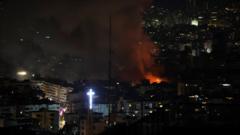The U.N. Security Council faced a significant setback as the United States vetoed a resolution demanding an immediate cease-fire in Gaza, highlighting its controversial stance on the Israel-Hamas conflict.
U.S. Blocks U.N. Resolution for Gaza Cease-Fire Amid Rising Tensions

U.S. Blocks U.N. Resolution for Gaza Cease-Fire Amid Rising Tensions
The U.S. vetoes a critical U.N. resolution urging a cease-fire and humanitarian aid for Gaza, further straining international relations.
The U.S. veto over a U.N. resolution calling for an immediate cease-fire in Gaza has intensified scrutiny on its foreign policy regarding Israel, as the majority of the Security Council members—including Russia—expressed overwhelming support for the resolution. This was the first cease-fire measure presented since President Trump took office, with the Security Council's ten nonpermanent members advocating for a halt to hostilities, the release of all hostages, and unrestricted humanitarian aid to Gaza.
Despite the global backing for the motion, the United States stood alone in opposition, reinforcing a narrative of isolation concerning its unwavering support for Israel. A joint statement from the nonpermanent members, articulated by Slovenia's U.N. ambassador Samuel Zbogar, underscored the urgent need to cease the violence and provide for the civilians affected in Gaza, who are facing humanitarian crises.
The process of passing Security Council resolutions necessitates at least nine votes in favor, with no vetoes from the five permanent members, including the U.S. This recent veto marks the fourth occasion the U.S. has obstructed calls for a cease-fire since the conflict reignited after Hamas's attack on Israel in October 2023. Furthermore, U.S. Ambassador Dorothy Camille Shea reiterated the official line that Israel has the right to self-defense while attributing the plight of Palestinians to Hamas's operational decisions.
This evolving scenario reflects a deepening divide in international perspectives on the ongoing violence and humanitarian situation in the region, with calls for a reassessment of U.S. policies in light of the mounting global condemnation.
Despite the global backing for the motion, the United States stood alone in opposition, reinforcing a narrative of isolation concerning its unwavering support for Israel. A joint statement from the nonpermanent members, articulated by Slovenia's U.N. ambassador Samuel Zbogar, underscored the urgent need to cease the violence and provide for the civilians affected in Gaza, who are facing humanitarian crises.
The process of passing Security Council resolutions necessitates at least nine votes in favor, with no vetoes from the five permanent members, including the U.S. This recent veto marks the fourth occasion the U.S. has obstructed calls for a cease-fire since the conflict reignited after Hamas's attack on Israel in October 2023. Furthermore, U.S. Ambassador Dorothy Camille Shea reiterated the official line that Israel has the right to self-defense while attributing the plight of Palestinians to Hamas's operational decisions.
This evolving scenario reflects a deepening divide in international perspectives on the ongoing violence and humanitarian situation in the region, with calls for a reassessment of U.S. policies in light of the mounting global condemnation.






















